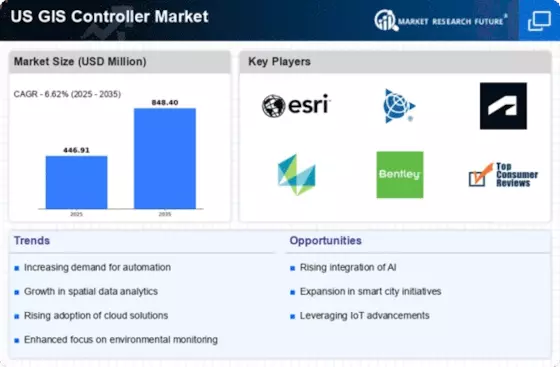Increased Demand for Spatial Data
The demand for spatial data is surging within the US GIS Controller Market, driven by various sectors such as agriculture, transportation, and urban development. Organizations are increasingly recognizing the value of geospatial information for optimizing operations and enhancing decision-making processes. As of January 2026, the market for spatial data is expected to reach $5 billion, with a significant portion attributed to the need for accurate and timely data in smart city initiatives. This growing demand is prompting manufacturers to develop more sophisticated GIS controllers that can handle large datasets and provide real-time analytics, thereby positioning themselves competitively in the market.
Government Initiatives and Funding
Government initiatives play a pivotal role in shaping the US GIS Controller Market. Federal and state agencies are increasingly investing in GIS technologies to improve public services and infrastructure management. For example, the Federal Geographic Data Committee (FGDC) has been promoting the use of GIS for better decision-making in land use and resource management. In 2025, federal funding for GIS-related projects reached over $200 million, reflecting a growing recognition of the importance of spatial data in policy-making. This financial support not only boosts the development of GIS controllers but also encourages collaboration between public and private sectors, fostering innovation and expanding the market.
Integration with IoT and Smart Technologies
The integration of GIS controllers with Internet of Things (IoT) devices is transforming the US GIS Controller Market. This convergence allows for the collection and analysis of vast amounts of data from various sources, enabling more informed decision-making. For instance, smart city projects are leveraging GIS technology to manage resources efficiently, monitor traffic patterns, and enhance public safety. As cities across the US adopt smart technologies, the demand for GIS controllers that can seamlessly integrate with IoT systems is expected to rise. This trend not only enhances operational efficiency but also opens new avenues for innovation within the market.
Technological Advancements in GIS Controllers
The US GIS Controller Market is experiencing rapid technological advancements that enhance the functionality and efficiency of GIS systems. Innovations such as real-time data processing, improved sensor technologies, and integration with artificial intelligence are driving the market forward. For instance, the incorporation of machine learning algorithms allows for more accurate spatial analysis and predictive modeling. As of January 2026, the market is projected to grow at a compound annual growth rate (CAGR) of approximately 8.5% over the next five years, indicating a robust demand for advanced GIS controllers. These technological improvements not only streamline operations but also reduce costs, making GIS solutions more accessible to various sectors, including urban planning, environmental monitoring, and disaster management.
Growing Awareness of Environmental Sustainability
There is a growing awareness of environmental sustainability within the US GIS Controller Market, influencing the adoption of GIS technologies. Organizations are increasingly utilizing GIS controllers to assess environmental impacts, manage natural resources, and support conservation efforts. As of January 2026, the market is witnessing a shift towards eco-friendly practices, with many companies prioritizing sustainability in their operations. This trend is further supported by regulatory frameworks that encourage the use of GIS for environmental monitoring and compliance. Consequently, the demand for GIS controllers that facilitate sustainable practices is likely to increase, reflecting a broader commitment to environmental stewardship.















